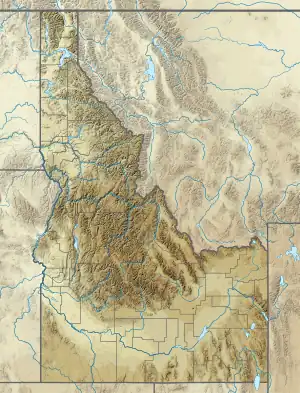Little Regret Peak
Little Regret Peak is an 11,090-foot elevation (3,380 m) mountain summit located in Custer County, Idaho, United States.
| Little Regret Peak | |
|---|---|
 North aspect, aerial view | |
| Highest point | |
| Elevation | 11,090 ft (3,380 m)[1] |
| Prominence | 310 ft (94 m)[1] |
| Parent peak | Mount Breitenbach (12,140 ft)[2] |
| Isolation | 1.60 mi (2.57 km)[2] |
| Coordinates | 44°05′12″N 113°41′00″W[3] |
| Geography | |
 Little Regret Peak Location in Idaho  Little Regret Peak Little Regret Peak (the United States) | |
| Location | Salmon–Challis National Forest |
| Country | United States of America |
| State | Idaho |
| County | Custer |
| Parent range | Lost River Range Rocky Mountains |
| Topo map | USGS Leatherman Peak |
| Geology | |
| Age of rock | Mississippian[4] |
| Mountain type | Fault block |
| Type of rock | Limestone[4] |
| Climbing | |
| First ascent | 2005 by Rick Baugher[1] |
| Easiest route | class 3 scrambling[2] |
Description
Little Regret Peak is part of the Lost River Range which is a subset of the Rocky Mountains. The mountain is set on land managed by Salmon–Challis National Forest. Neighbors include No Regret Peak one mile south, line parent Mount Breitenbach,[2] 1.75 mile south-southeast, Mount Corruption two miles north, Leatherman Peak three miles to the west, and Borah Peak, the highest peak in Idaho, is seven miles to the northwest. Precipitation runoff from the mountain's slopes drains to Pahsimeroi River. Topographic relief is significant as the summit rises 2,700 feet (820 meters) above the East Fork Pahsimeroi in one mile.
Climate
Based on the Köppen climate classification, Little Regret Peak is located in an alpine subarctic climate zone with long, cold, snowy winters, and cool to warm summers.[5] Winter temperatures can drop below −10 °F with wind chill factors below −30 °F.
References
- Idaho: A Climbing Guide, Little Regret Peak
- "Little Regret Peak - 11,682' ID". listsofjohn.com. Retrieved 2022-09-01.
- "Little Regret Peak, Idaho". Peakbagger.com. Retrieved 2022-09-01.
- Jeffrey Lee, James P. Evans (2011), Geologic Field Trips to the Basin and Range, Rocky Mountains, Snake River Plain, and Terranes of the U.S. Cordillera, Geological Society of America, p. 118
- Peel, M. C.; Finlayson, B. L.; McMahon, T. A. (2007). "Updated world map of the Köppen−Geiger climate classification". Hydrol. Earth Syst. Sci. 11: 1633–1644. ISSN 1027-5606.
External links
- Little Regret Peak: Idaho: A Climbing Guide